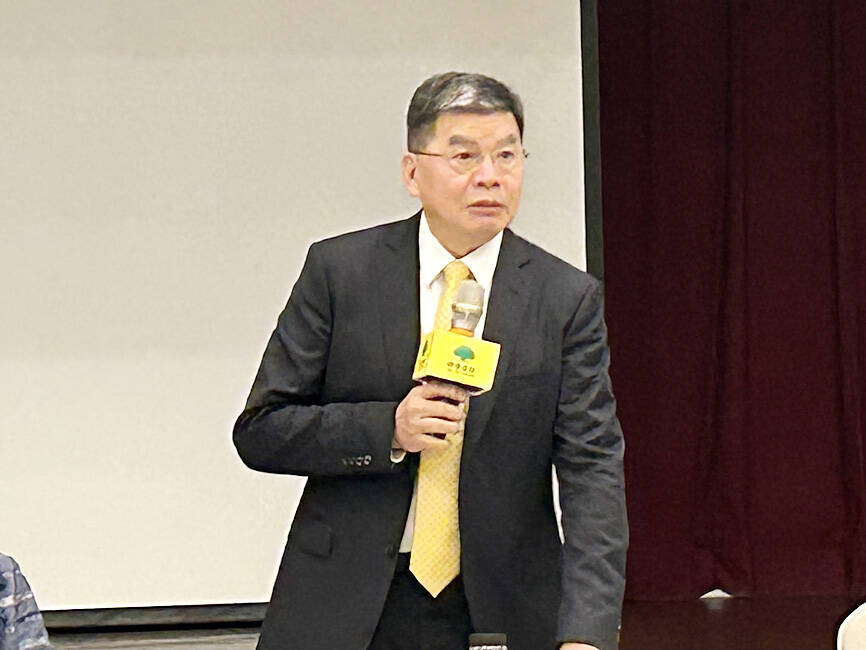The head of the nation’s largest financial group has suggested regulators adopt withdrawal curbs to save local banks from the type of collapses in public confidence that have rocked global markets in the past few weeks.
Cathay Financial Holding Co (國泰金控) president Lee Chang-ken (李長庚) warned of the increased risk lenders face of rapid bank runs in an age of social media and digital banking.
“NT$1.3 trillion [US$42 billion] was withdrawn from Silicon Valley Bank in less than 48 hours,” Lee said at the company’s earnings briefing in Taipei on Wednesday. “If that happened in Taiwan today, any bank it happened to would die.”

Photo: Wu Hsin-tien, Taipei Times
Lee said that equity markets can impose restrictions on trading to protect listed companies and suggested a “fuse mechanism” to protect banks when they face liquidity crises.
He said he was just “throwing the idea out there” for everyone to discuss.
The Financial Supervisory Commission declined to immediately comment.
Lee’s concerns echoed remarks from Citigroup Inc chief executive officer Jane Fraser on Wednesday, who cited mobile banking as a “game changer” for lenders in the face of client worries about their deposits.
The unease among senior bankers comes after weeks of turmoil in global financial markets triggered by the collapse of SVB Financial Group and several other smaller US lenders.
“We all need to think about this problem,” Lee said. “If this can happen in the US, it can happen in Taiwan.”

Quanta Computer Inc (廣達) chairman Barry Lam (林百里) is expected to share his views about the artificial intelligence (AI) industry’s prospects during his speech at the company’s 37th anniversary ceremony, as AI servers have become a new growth engine for the equipment manufacturing service provider. Lam’s speech is much anticipated, as Quanta has risen as one of the world’s major AI server suppliers. The company reported a 30 percent year-on-year growth in consolidated revenue to NT$1.41 trillion (US$43.35 billion) last year, thanks to fast-growing demand for servers, especially those with AI capabilities. The company told investors in November last year that

United Microelectronics Corp (UMC, 聯電) forecast that its wafer shipments this quarter would grow up to 7 percent sequentially and the factory utilization rate would rise to 75 percent, indicating that customers did not alter their ordering behavior due to the US President Donald Trump’s capricious US tariff policies. However, the uncertainty about US tariffs has weighed on the chipmaker’s business visibility for the second half of this year, UMC chief financial officer Liu Chi-tung (劉啟東) said at an online earnings conference yesterday. “Although the escalating trade tensions and global tariff policies have increased uncertainty in the semiconductor industry, we have not

Intel Corp has named Tasha Chuang (莊蓓瑜) to lead Intel Taiwan in a bid to reinforce relations between the company and its Taiwanese partners. The appointment of Chuang as general manager for Intel Taiwan takes effect on Thursday, the firm said in a statement yesterday. Chuang is to lead her team in Taiwan to pursue product development and sales growth in an effort to reinforce the company’s ties with its partners and clients, Intel said. Chuang was previously in charge of managing Intel’s ties with leading Taiwanese PC brand Asustek Computer Inc (華碩), which included helping Asustek strengthen its global businesses, the company

Power supply and electronic components maker Delta Electronics Inc (台達電) yesterday said it plans to ship its new 1 megawatt charging systems for electric trucks and buses in the first half of next year at the earliest. The new charging piles, which deliver up to 1 megawatt of charging power, are designed for heavy-duty electric vehicles, and support a maximum current of 1,500 amperes and output of 1,250 volts, Delta said in a news release. “If everything goes smoothly, we could begin shipping those new charging systems as early as in the first half of next year,” a company official said. The new